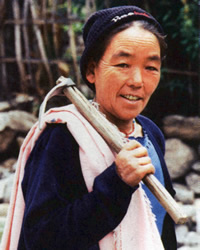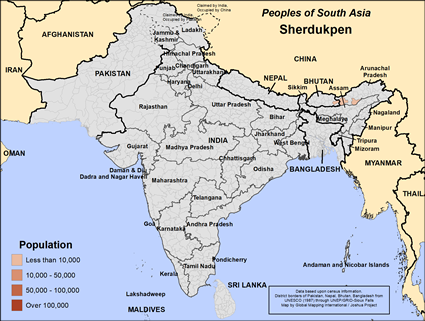Sherdukpen in India

Photo Source:
Copyrighted © 2026
Peoples of the Buddhist World, Asia Harvest All rights reserved. Used with permission |

Map Source:
People Group data: Omid. Map geography: UNESCO / GMI. Map Design: Joshua Project
|
| People Name: | Sherdukpen |
| Country: | India |
| 10/40 Window: | Yes |
| Population: | 3,500 |
| World Population: | 3,800 |
| Primary Language: | Sherdukpen |
| Primary Religion: | Buddhism |
| Christian Adherents: | 0.74 % |
| Evangelicals: | 0.00 % |
| Scripture: | Translation Started |
| Ministry Resources: | No |
| Jesus Film: | No |
| Audio Recordings: | Yes |
| People Cluster: | South Asia Tribal - other |
| Affinity Bloc: | South Asian Peoples |
| Progress Level: |
|
Introduction / History
The Sherdukpen's oral history says that they originated from the marriage of a Tibetan prince with a princess of Assam, possibly of Kachari origin. Sherdukpen culture and language are strange in that they are distinct from the other Tibeto-Burman varieties in Arunachal Pradesh. This suggests they once migrated into the area from far away. Most of the Sherdukpen people live either in India's northeastern state of Arunachal Pradesh or in Bhutan.
What Are Their Lives Like?
Most of the Sherdukpen people are farmers who supplement their diet through hunting and fishing. Some have livestock. They use simple tools for their work.
Visitors to their communities can easily identify the Sherdukpen because their dress is totally different from that of other nearby peoples. The men's dress consists of a shawl, waist belt, jacket and a cap made of yak's hair. The Sherdukpen women wear a white cotton or silk gown called a sinka.
The Sherdukpen language is part of the Kanauri branch of the Tibeto-Burman family. There are dialect differences between the Sherdukpen spoken in different villages.
Before a wedding can take place, a suitable bride price must be negotiated between the families of the bride and groom. The groom's family must come up with an acceptable form of payment to compensate the bride's family for all the years of expense and effort they spent in raising the girl. The most common form of marriage is a negotiated arranged one. The parents of both the boy and the girl arrange the marriage. The girl is ritually eloped by the boy's parents and their relatives. After the bride price has been settled, a Buddhist lama is called in to consult the horoscopes to determine the best time and day for the wedding to take place. These days love marriages are becoming more common.
What Are Their Beliefs?
Buddhism first came to the Sherdukpen in the mid-1700s. Almost every one of them identifies as Buddhist today.
The Buddhist lamas, known as chize, double as shaman priests among the Sherdukpen. They perform weddings and funerals and act as mediators between the spirit world and the community. Thus, the primary felt need of the Sherdukpen is about dealing with the spirit world, not following the teachings of Gautama Buddha.
What Are Their Needs?
For countless centuries the Sherdukpen people, few in number yet unique, lived and died without any knowledge of the gospel. There are only a handful of Christ's disciples among this people group.
Prayer Points
Pray for the authority of Christ to bind hindering spiritual forces to lead them from darkness to light.
Pray for signs and wonders among them and for great breakthroughs with a rapid multiplication of disciples and house churches.
Pray for bold workers who are driven by the love of the Holy Spirit to go to them.
Pray for an unstoppable movement to Christ among them.